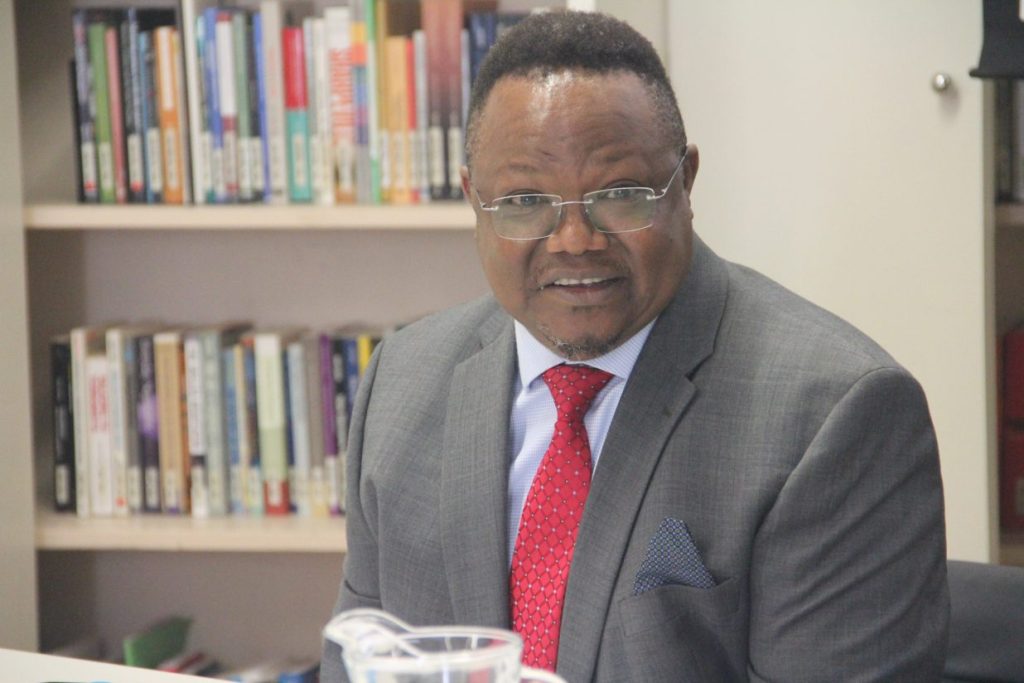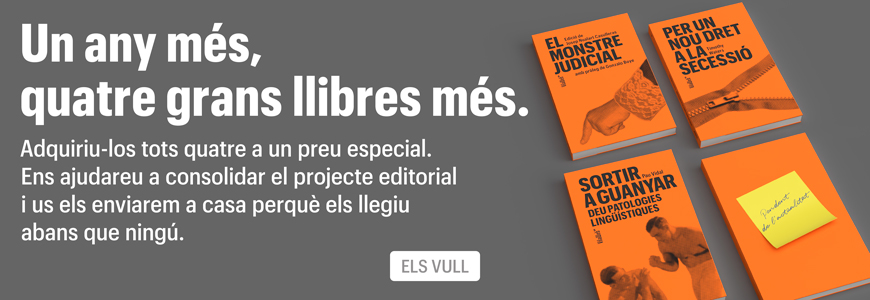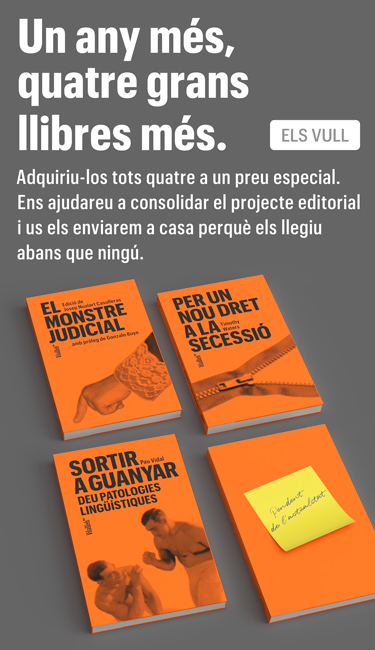23.05.2022 - 11:40
|
Actualització: 13.06.2022 - 10:05
In September 2017, while Catalonia was preparing for a referendum which was to mark a turning point for the country as a whole, Tanzanian opposition leader Tundu Lissu was the victim of an almost fatal assassination attempt. He was forced to immediately resign from the Tanzanian parliament and go into exile. Since then, the destiny of Lissu and the Catalan independence movement have in some ways been intertwined: Lissu now lives in exile in Belgium, seeking refuge from a government with authoritarian leanings which has tried to prosecute him for sedition, and which has also tried to thwart his attempts to return to the country where he was born. Lissu acknowledges the similarities between Catalonia’s struggle for independence and the struggle for democracy in Tanzania, seeing them as part of a broader fight: the struggle against political repression around the world.
We spoke in the hotel where Lissu is staying in the centre of Barcelona. He recently gave a talk entitled Political Repression and Exile in Africa: The Case of Tanzania, at the behest of Catalonia’s Ministry for Foreign Action and Open Government. He talked about the political crackdown in his country, the ties with Catalonia’s independence struggle and Zanzibar’s own independence movement.
—You’ve lived in exile in Belgium since the 2017 assassination attempt in which you almost lost your life, after becoming one of the main opposition leaders to then-President John Magufuli.
—On 7 September 2017 I was returning home from the Tanzania Parliament, at the end of my working day, when I saw two vehicles following me towards the building where I lived. I was the opposition Chief Whip at the time and, therefore, lived in a heavily guarded government building. However, that day the security services were nowhere to be seen, meaning the attackers were able to enter the building and shoot me at close range. I was shot sixteen times. I left the country that very night. Just to be clear, in Tanzania you can’t just walk into a government building where ministers and senior parliamentarians live. Such places are guarded by armed personnel round the clock. Let’s face it: only someone very high up in government could remove such a security detail. To give you an idea of who this person might be: two hours before the attack, Magufuli had literally said that those who were against his economic plan —which I had vehemently opposed— did not deserve to live. But the story doesn’t end there: I was eventually removed from office because the government claimed I had neglected my parliamentary duties without good reason. I’d been arrested eight times in the year before the attack and tried for sedition six times. In some respects, according to the government I was public enemy number one. In the intervening years, I’ve learnt from government officials that it was the president himself who ordered the attack, and that the attackers were government security operatives.
—In 2020 you returned briefly to Tanzania to stand in an election that was widely seen to have been rigged. What happened?
—President Magufuli had begun his personal “war on democracy” some time in 2020. The election was an opportunity for the opposition to show that we’d taken a blow, but that we still had a fighting chance, and that we could try to snatch the power away from the president. I’ve been standing for election in Tanzania since the first multiparty elections in the country’s history, in 1995, and I can assure you that the 2020 election was completely different from anything I’d ever seen before. To begin with, never have so many opposition candidates been disqualified. Just to give you an idea: right now, 11% of Tanzania’s parliamentary seats are occupied by MPs who did not stand for election. And why is that? Well, it’s because the government disqualified all their rivals and simply handed them a seat. In local councils, the figure is 22%: almost a quarter of Tanzanian councillors were not voted into office. And this isn’t due to a lack of opposition candidates; it’s because all their opponents have been disqualified. They’ve been unfairly disbarred by the election commission, a body wholly controlled by the president and his party. Aside from the disqualification scandal, the campaign was marred by violence, not only against me but also against other opposition parliamentary candidates. The government prevented me from campaigning for the last ten days of the election race simply because the president couldn’t keep up with me. As he didn’t have the stamina to stay on the campaign trail, they decided to ban the other candidates from doing so. It wasn’t a real election: on the day of the vote, the authorities prevented about three-quarters of our representatives from entering the polling stations. However you look at it, the election was neither fair nor free. And I’m not alone in saying so. The result had already been decided before the first ballot was cast.
—Let’s take a look at the background to current events. Up until 1992 Tanzania was a one-party state ruled by the Chama Cha Mapinduzi (CCM) party, which has remained in power. Is the legacy of one-party politics still alive in Tanzania?
—The constitution of Tanzania as we know it today was approved in 1977 under the one-party regime. When Tanzania adopted a multiparty political system in 1992, the constitutional commission advising the government on the transition to democracy recommended that a new constitution be drafted. Even the experts appointed by the president himself said that it was not enough to formally embrace multipartyism: the constitution also needed to be revised. Needless to say, the President rejected this recommendation. And now we have a country that, while technically a multiparty democracy, operates according to a pre-democratic constitution which concentrates power in the hands of the president. And the president, who has always been linked to the CCM, has used his power to ensure that his party wins every election and stays in power.
—Tanzania’s democratic backlash has also coincided with the emergence of an opposition. I have the impression that when the CCM ruled unchallenged, it was easy to maintain a pretence of democracy, but now the mask has slipped.
—Precisely. Tanzania became a multiparty state as a result of political pressure from the international community, the West in particular. Realising that times were changing, the Tanzanian government cleverly forestalled this pressure by democratizing early. This anticipation allowed them to limit the reforms to a bare minimum instead of building a brand new political system: it allowed the creation of new political parties, always subject to the control and the watchful eye of the state. However, aside from this, little else was done. In other words, this pre-democratic structure, characterized by the concentration of power in a single party, remains intact. But when the opposition began to gain momentum and it became clear that the CCM might even lose power, the government closed ranks and decided to take action: hence what’s been termed Magufuli’s “war on democracy”. In my opinion, this anti-democratic campaign is simply the regime’s response the people’s desire for democracy.
—Aside from the obvious differences, I see certain similarities with the situation in Catalonia: pre-democratic structures which are still very much alive, increased repression in response to growing opposition, dissidents in exile…
—It’s a fair point. Unfortunately —and I ought to add, outrageously— there are some very disturbing parallels between Tanzania and democratic Spain. The violence with which the Spanish state cracked down on the 1 October referendum, held just weeks after the attempt on my life, is reminiscent of the violence wielded by African dictatorships. I had the honour of meeting President Puigdemont in Brussels and realized that he was unable to return to Catalonia because he feared for his freedom. Not to mention the pro-independence leaders who didn’t leave and who ended up in prison… This kind of repression is typical of African dictatorships, such as Tanzania, Museveni’s Uganda or Kagame’s Rwanda. I find it absolutely outrageous that the Spanish government has deployed these sorts of tactics against legitimately elected Catalan political leaders. Democratic leaders shouldn’t be punished for being elected by their people. Punishing disagreement is what African regimes have always done. It’s a disgrace which the Spanish people ought to reflect on very seriously.
—You live in Belgium, like many of the Catalans in exile. Do you consider yourself to share a common cause?
—Solidarity with those who fight for justice, with those who fight for independence… is of the utmost importance. The world needs to stand by its struggles. The small contribution I can make to the Catalan people is to offer my full support to their condemnation of the repression against the pro-independence leaders. No country which claims to be democratic can criminalize political dissent. The crime of sedition is usually reserved for politicians who violently rise up against constitutional governments. Sedition is not a crime which is brandished against politicians who express their disagreement peacefully, who call elections, who consult their voters as to what their wishes are… That’s not sedition! If holding a referendum counts as sedition, then we need a new definition of what constitutes “sedition”. Obviously, the situation in Europe —in Spain, in Catalonia— is very different from the situation in Tanzania. After all, Catalan independence leaders continue to be members of the European Parliament and have a platform from which to voice their struggle and that of more people in other parts of the world, such as Tanzania. My visit, in part, is also an attempt to find common ground between the struggle for the independence of Catalonia and the struggle for democracy in Tanzania. That’s why I’m here: to ask our Catalan friends to support our struggle.
—You also support self-determination for Zanzibar, the island which was annexed to the Republic of Tanganyika in 1964 to create the current state of Tanzania. You once stated that up until now, “the only way to maintain Tanzania’s territorial integrity has been through violence.” What is the historical relationship between Tanganyika and Zanzibar?
—Zanzibar existed as a sovereign state for hundreds of years. The first diplomatic relations between the independent state of Zanzibar and the United States were established in 1837, and by 1860 the island already had relations with the United Kingdom, France and Portugal. Zanzibar didn’t come under foreign control until 1896, when it became a British protectorate. But in 1963 the British left and recognized its independence, and soon after an election was called in which the new government of the island was elected. A month later, this government was violently overthrown in a revolution that possibly killed thousands, and the state of Zanzibar was forcibly annexed by Tanganyika, which forced the island’s president to sign a treaty, or Articles of Union, in exchange for the Tanzanian army being withdrawn from Zanzibar. There was also a geopolitical dimension to this whole story: the revolutionary government of Zanzibar was quite progressive, and the Western allies had set out to intervene militarily on the island to prevent it from becoming an “African Cuba”. This explains why Zanzibar agreed to a treaty on very unequal terms. The document stipulated that the president of Tanganyika would be the president of the union, and that the union would assume virtually all the powers that the island had up until then: international relations, defence, fiscal policy, customs policy, control over its airspace… Any aspect of government with any sort of political significance was transferred to the government of the union, in other words, to the government of Tanganyika. The Articles of Union of Tanganyika and Zanzibar have severely affected Zanzibar from an economic, political, social and cultural standpoint, which is why the people of Zanzibar have always opposed them. In short, the relationship between Tanganyika and Zanzibar, this so-called “union”, is in fact a colonial relationship.
—Could a referendum help resolve Zanzibar’s situation?
—That goes without saying. How is a colonial relationship resolved? Quite easily: with the right to self-determination. As long as Zanzibar remains a colony of Tanganyika, the people of Tanganyika will continue to be without… The price of keeping Zanzibar subjugated to Tanganyika is the lack of rights for us, the people of Tanganyika. The democratization of Tanganyika thus implies independence for Zanzibar.
—Samia Suluhu Hassan, the new President of Tanzania, is from Zanzibar. Do you believe that her coming to power marks a new beginning not only for Zanzibar, but also for the state of Tanzania?
—For all intents and purposes, the president of Tanzania is the president of Tanganyika. Meaning, it doesn’t matter if they’re from Zanzibar, the government they head is a government which derives its power from the subjugation of Zanzibar. Hassan is from a caste of Zanzibari politicians who have benefited from the crumbs that Tanganyika occasionally throws to the island… She won’t go against the status quo. Unless the people of Zanzibar decide to do something about it, the Hassan government will pursue the same policies which have kept the island subjugated for so long. I can assure you there will be no new beginning.




